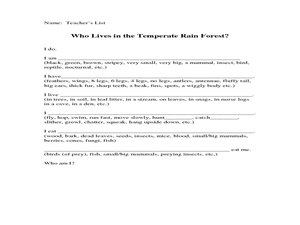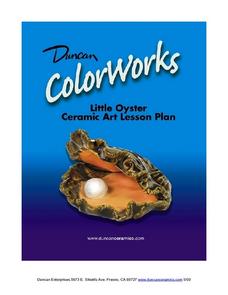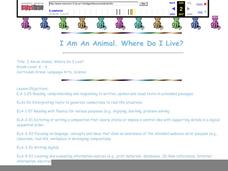Scholastic
Minibeasts
Lead young scientists to discover insects outdoors. After investigating, students will record observations, learn about these fascinating creatures, craft, and role play.
Lerner Publishing
Teaching Habitats
What makes up a habitat? Use this resource to engage first graders in the exploration of desert, wetland, forest, and ocean habitats. Youngsters classify plants and animals into the four distinct habitats through drawings and cutting and...
US Mint
Desert Dwellers
What can a quarter possibly teach young learners about desert ecosystems? More than you might think. After displaying and discussing the included picture of the Arizona state quarter, the class participates in a series of...
Curated OER
Marine Field Trip to Whytecliff Park
Pupils study the intertidal habitat, tidal pools and the organisms that live in them. In this aquatic ecosystems instructional activity students take a field trip and experience first hand the local seashore environment.
Curated OER
The Needs of Living Things
Learners watch video clips of animals and plants in their natural environment, to gather evidence that all living things have basic survival needs. Students draw pictures of real or imaginary pets eating, drinking, breathing, and taking...
Curated OER
The Life Cycle of the Butterfly
Students examine the life of a butterfly. They write a biography from the point of view of a caterpillar using new vocabulary. They use magnifying glasses to examine butterflies and caterpillars.
Curated OER
How Do Plants Carry Out Life Processes?
In this plants worksheet, students write in how a plant's leaves, roots, and stems help it to live. This worksheet is a graphic organizer.
Curated OER
Butterfly Lesson Plans
Students study the life cycle of the Monarch Chrysalis. In this butterfly life cycle lesson, students study the monarch butterfly life cycle and focus on the fourth stage of the life cycle. Students draw a picture about the fourth stage...
Curated OER
Butterfly Bonanza
Young scholars describe life cycle of the butterfly after reading and singing about butterflies.
Curated OER
The Tadpole and the Frog
First graders examine the life cycle of the frog, and research frogs of the Nez Perce reservation and their requirements for survival. They observe the development of frog eggs and record their observations in science journals.
Curated OER
What's in the Water?
Students examine how pollutants can affect ocean animals. In this pollution lesson, students read a story about the ocean floor, think about what would happen to the plants and animals if the ocean became dirty or polluted, and conduct...
Curated OER
C.M. Beg
First graders are introduced to a pretend boy named C.M. Beg. The initials of the boy be a mnemonic device to help students explain the basic characteristics of living things.
Curated OER
What Is a Pond?
Students identify animals and plants that live in a pond. In this marine biology lesson, students create a chart of animals and plants they think they would see at the pond. Students create a "pond symphony" by imitating the sounds they...
Curated OER
Animal Homes
Students explore how an animal's relationship to its habitat affect the animal's survival. They discuss animal habitats and the animal's relationship to that habitat through the food chain, life cycle, community, and balance of nature....
Curated OER
What Is A Plant?
Students explore plants. In this plant lesson, students examine organisms to determine which are plants. During this introductory lesson, students explore characteristics of living things.
Curated OER
What's A Mammal?
Students examine mammals understanding what a mammal is and reviewing the eleven mammal groups. In this science lesson, students play a game known as Mystery Mammal Game. Yet, first students research about the mammal and then give...
Curated OER
The Radish Experiment
First graders grow radishes. In this Science instructional activity, 1st graders observe the growth of radishes in both the light and dark. Students discuss what plants need to live.
Curated OER
Larva and Adult Antlion Body Parts
Students identify the major body segments of antlions. Through the use of diagram worksheets, students label the various body parts of the antlion. They review the life cycle of antlions from the larva stage to adult. Several activities...
Curated OER
Is This a House for Hermit Crab?
First graders identify text that uses sequence or other logical order. They identify and interpret how different plants and animals inhabit different kinds of environments and have external features that help them thrive in different...
Curated OER
Layers of the Forest
Students explore rain forests. For this rain forest ecosystems lesson, students identify and describe the layers of the rain forest. Students paint and decorate a large rain forest mural. Students write riddles about animals that...
Curated OER
Red Wigglers
Students are introduced to the benefits of using Red Wiggler worms to produce compost. They identify the requirements for the worms and the methods to follow in order to produce compost. They draw a picture of a functioning worm bin.
Curated OER
Little Oyster: Ceramic Lesson
Children will love researching and then creating a bottom dwelling mollusk of their own. They watch clips describing the ocean ecosystem and how oysters fit into their environment. Next, they research what oysters eat and how they look....
Curated OER
Life Cycles of Plants
Students discover the general life cycle of a plant, the parts of a plant, and what it needs to grow. They plant bean seeds and discuss the parts of a plant and what it needs to grow.
Curated OER
I Am An Animal: Where Do I Live?
Students make an alphabet booklet using the computer to find pictures and facts about farm animals, zoo animals and pets. They write facts about the animals: where they live, what they eat, their coloring, etc.























